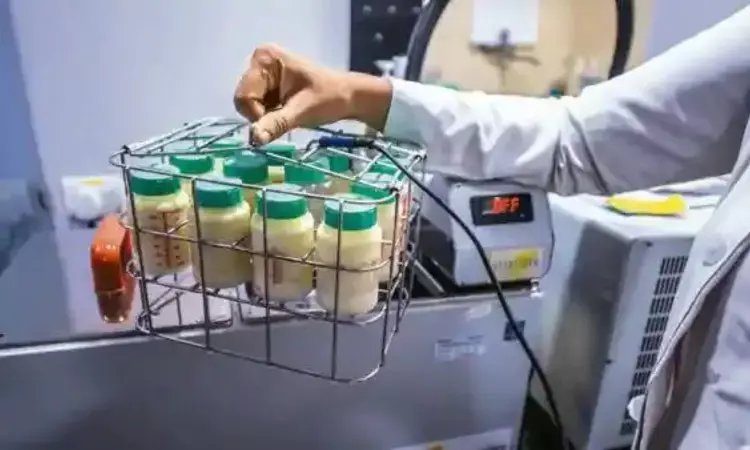- Home
- Medical news & Guidelines
- Anesthesiology
- Cardiology and CTVS
- Critical Care
- Dentistry
- Dermatology
- Diabetes and Endocrinology
- ENT
- Gastroenterology
- Medicine
- Nephrology
- Neurology
- Obstretics-Gynaecology
- Oncology
- Ophthalmology
- Orthopaedics
- Pediatrics-Neonatology
- Psychiatry
- Pulmonology
- Radiology
- Surgery
- Urology
- Laboratory Medicine
- Diet
- Nursing
- Paramedical
- Physiotherapy
- Health news
- Fact Check
- Bone Health Fact Check
- Brain Health Fact Check
- Cancer Related Fact Check
- Child Care Fact Check
- Dental and oral health fact check
- Diabetes and metabolic health fact check
- Diet and Nutrition Fact Check
- Eye and ENT Care Fact Check
- Fitness fact check
- Gut health fact check
- Heart health fact check
- Kidney health fact check
- Medical education fact check
- Men's health fact check
- Respiratory fact check
- Skin and hair care fact check
- Vaccine and Immunization fact check
- Women's health fact check
- AYUSH
- State News
- Andaman and Nicobar Islands
- Andhra Pradesh
- Arunachal Pradesh
- Assam
- Bihar
- Chandigarh
- Chattisgarh
- Dadra and Nagar Haveli
- Daman and Diu
- Delhi
- Goa
- Gujarat
- Haryana
- Himachal Pradesh
- Jammu & Kashmir
- Jharkhand
- Karnataka
- Kerala
- Ladakh
- Lakshadweep
- Madhya Pradesh
- Maharashtra
- Manipur
- Meghalaya
- Mizoram
- Nagaland
- Odisha
- Puducherry
- Punjab
- Rajasthan
- Sikkim
- Tamil Nadu
- Telangana
- Tripura
- Uttar Pradesh
- Uttrakhand
- West Bengal
- Medical Education
- Industry
Delhi AIIMS launches Payodhi milk bank for critically ill preterm babies

AIMS Mohali Achieves National Milestone with Breastfeeding-Friendly Hospital Status
New Delhi: To enhance neonatal care, the All India Institute of Medical Sciences (AIIMS) has launched ''Payodhi'', a human milk bank aimed at supporting critically ill preterm babies in the Neonatal Intensive Care Unit (NICU). This initiative is a significant step in addressing the nutritional needs of vulnerable infants, particularly preterm babies, who rely on their mother's milk for survival and development.
Medical experts emphasize that mother’s milk is essential for newborns, especially for premature infants who are more susceptible to infections and health complications. However, not all mothers are able to breastfeed due to medical conditions or other constraints. For these cases, pasteurized donor human milk is the safest and most effective alternative, aligning with both World Health Organization (WHO) and Indian government guidelines.
Before the establishment of Payodhi, AIIMS partnered with Lady Hardinge Medical College (LHMC) to facilitate the pasteurization of donor milk. The staff would transport the donated milk to LHMC, ensuring proper cold chain maintenance throughout the process.
However, with the establishment of Payodhi in September 2024, AIIMS has taken a major leap in enhancing its neonatal care infrastructure. The milk bank, which is managed by the Division of Neonatology in the Department of Pediatrics, is designed to cater specifically to the needs of infants in the NICU, offering a wide range of services including maternal counselling, surplus milk donation, pasteurization, and storage.
Also Read:Delhi: MCD's first milk bank set up at Swami Dayanand Hospital
The availability of donor milk is particularly crucial for premature infants who need specialized nutrition to support their recovery, survival, and brain development. Speaking to TOI, Dr Kajal Jain, in charge of the milk bank, said that lactating mothers donate approximately 20 litres monthly.
This milk helps provide essential nutrition to 15 to 18 preterm babies in the NICU. In some cases, mothers donate even larger quantities, ranging from 25 to 50 litres, to help their babies and others during their hospitalization. These services are provided free of charge. She further explained that preterm neonates in the NICU require maternal milk for optimal health and development.
The introduction of Payodhi is particularly important for infants whose mothers are either deceased or unable to express milk. In such cases, donor milk becomes a lifeline, providing essential nutrition to babies. This process involves extensive screening of mothers for conditions such as HIV and hepatitis, as well as lifestyle assessments to ensure the safety and suitability of the donated milk.
The collection and distribution services are exclusively available to mothers and infants admitted to AIIMS. The operation of a human milk bank involves several crucial stages to ensure the safe collection, storage, and distribution of donor milk to infants.
Also Read: Human milk bank inaugurated at Nashik Civil hospital
According to TOI, the initial phase involves comprehensive screening of potential donors, including assessment of medical history, lifestyle evaluation, and blood testing to confirm their health status and donation eligibility.
Payodhi is not the only human milk bank initiative making strides in neonatal care. In December of the previous year, Safdarjung Hospital also inaugurated a Lactation Management Unit (LMU). These initiatives are part of a larger movement towards improving healthcare outcomes for premature and critically ill infants.


